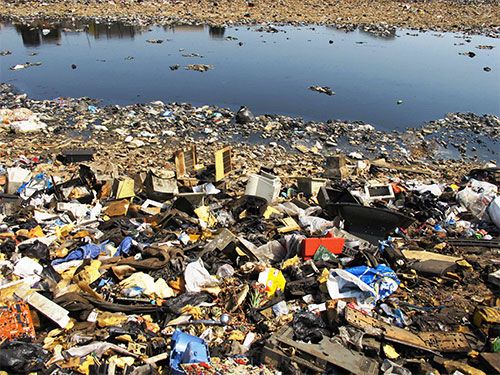Impacts of E-Waste on the Environment
Impacts of E-Waste on the Environment
E-waste, or electronic waste, is waste from all sorts of electronics ranging from computers and mobile phones, to household electronics such as food processors, pressure, cookers etc.
The effects of improper disposal of this E-waste on the environment are little known; these impacts nonetheless pose very real threats and dangers to the global environment at large.
Threats posed by E-waste to the environment.
Improper disposal of these electronic wastes affect the soil, air, and water components of the environment.
Effects on air
One of the most common effect of E-waste on air is through air pollution. For example, a British documentary about Lagos and its inhabitants, called Welcome to Lagos, shows a number of landfill scavengers who go through numerous landfills in Lagos looking for improperly disposed electronics which includes wires, blenders, etc., to make some income from the recycling of these wastes. These men were shown to burn wires to get the copper (a very valuable commodity) in them by open air burning which can release hydrocarbons into the air.
Effects on water
When electronics containing heavy metals such as lead, barium, mercury, lithium (found in mobile phone and computer batteries), etc., are improperly disposed, these heavy metals leach through the soil to reach groundwater channels which eventually run to the surface as streams or small ponds of water. Local communities often depend on these bodies of water and the groundwater. Apart from these chemicals resulting in the death of some of the plants and animals that exist in the water, intake of the contaminated water by humans and land animals results in lead poisoning. Some of these heavy metals are also carcinogenic.
Effects on soil
In this way, toxic heavy metals and chemicals from e-waste enter the "soil-crop-food pathway," one of the most significant routes for heavy metals' exposure to humans. These chemicals are not biodegradable-they persist in the environment for long periods of time, increasing the risk of exposure.
These dangers posed by improper disposal on the environment ultimately have impacts on human beings -human cost; the health effects of these toxins on humans include birth defects (irreversible), brain, heart, liver, kidney and skeletal system damage. They also significantly affect the nervous and reproductive systems of the human body. When computer monitors and other electronics are burned, they create cancer-producing dioxins which are released into the air we breathe. If electronics are thrown in landfills, these toxins may leach into groundwater and affect local resources. Thus improper disposal of e-waste not only has effects on the environment, it indirectly and ultimately poses grave dangers to humans and livestock.
So, now that we have an idea of what impact improper disposal of E-waste has on the environment, how do we dispose these E-waste properly to help preserve the environment?

The answer is there are a number of ways to do this, they include:
1. Checking with the local government on laws and regulations guiding ethical and safe disposal of these waste. As a result of the increasing threat that e-waste poses to the environment, some communities have begun to undergo civic programs in which inhabitants of such communities take unwanted electronics to designated drop-off locations (this takes after the idea used in plastic bottle collections to tackle pollution caused by plastic bottles).
2. With the donation of electronics, some of the e-waste disposed can actually be reused, and by doing this, one can reduce pollution caused by e-waste and also give access to people who would not otherwise have access to these devices.
3. With the use of a certified E-waste recycler, one can find an ethical and safe recycler certified through the Basel Action Network (BAN), a non-profit organization. Regionally, in Africa E-Terra, a Nigerian company, specializes in recycling, and safe and ethical destruction of these electronics.
With all the above said, we all can be responsible citizens by being mindful of the dangers posed by E-waste to the environment and do as much as we can to protect our environment, because ultimately e-waste does not just affect the environment, it ultimately affects us humans too/ as well.
